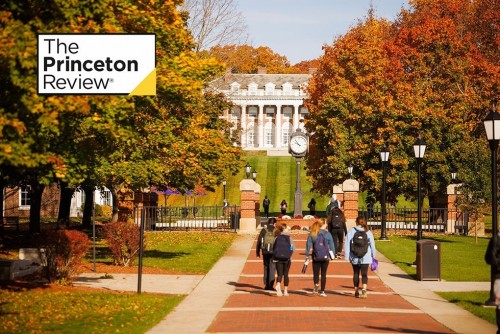English Major & Minor
Stonehill's English Department provides students with a firm grounding in English, American and Anglophone literature and literary history, and fosters effective writing and creative critical thinking.
One Theme, Endless Possibilities for English Majors
Few degrees provide the breadth of options available to English graduates, who find success in fields that include law, publishing, business and education.
The English major and minor alike offer a multi-disciplinary approach to literary study that forges connections between texts and contexts, as well as between the literary arts and studies in the humanities.
Our English degree programs enjoin students to explore the literary arts as a contact zone where history, critical analysis, theory and creative writing converge.
Programs of Study
The English major and minor is designed to help our students develop their critical thinking, cultural awareness, creativity and analytical writing.
The Creative Writing minor is designed to develop writing skills from the beginner to the advanced levels, providing for both casual writers from across the disciplines and more serious writers considering an MFA or a writing career.
Students in the Digital Humanities minor apply computational models for analyzing and visualizing data to the inquiry and study of traditional humanities disciplines, such as literature and languages, philosophy, history, religious studies, and the arts, as well as the social sciences and business.
Explore Literature in All its Forms
Our interdisciplinary approach to the literary arts encourages students to make complex connections, craft persuasive arguments and discover innovative ways of approaching real-world problems.
Through courses in poetry, fiction, drama, non-fiction, graphic novels, cinema and new media, students examine the world through multiple lenses, navigate a variety of literatures and cultures in English and pursue new ways of seeing received truths.
With two journals of culture and letters, and with the Creative Writing minor offering courses in poetry, fiction, creative non-fiction and playwriting, the English Department also offers many chances for students to produce literature of their own and share their unique perspectives.
Recent Accolades
Organizations involved in assessing U.S. colleges and universities continually cite Stonehill as being among the best in the nation when it comes to value, outcomes and a commitment to making the world a better place. See full list of accolades.
-
WSJ “Value Added” Formula Rockets Stonehill Higher in Rankings
Stonehill moved up 62 places in this year’s WSJ “America's Best Colleges 2024” rankings, putting it in the top 12 among Massachusetts schools and top 6 percent nationally.
-
Princeton Review Ranks Stonehill in Top 20 in U.S. for Quality of Life
After considering input for 165,000 at colleges and universities across the country, The Princeton Review recently ranked Stonehill College 19th out of 389 schools for quality of life.
-
Money Magazine Ranks Stonehill Among Most Elite Colleges in U.S.
Less than 20% of the 700 schools on Money’s 2023 Best College list, including Stonehill, received 4.5 stars or higher in the magazine’s 5-star rating system.
Featured English Courses
Madness and Insight: Modernist Psychopathology
Telling Tales: Theories of Narrative
Competitive Advantages
Stonehill Undergraduate Research Experience
Internship Opportunities
English Society
Honor Society: Lambda Epsilon Sigma
English Majors Will Develop Proficiency in the Following Five Areas
- Understand how to identify textual patterns, perform close analysis, synthesize ideas and formulate compelling questions suitable for intellectual inquiry.
- Integrate authoritative sources into their own work and question authoritative truth claims effectively and productively.
- Distinguish between critical argumentation and opinion/summary. Be able to define key terms, identify potential counterarguments and structure evidence logically.
- Develop the ability to articulate, both orally and in writing, interpretations of literature that draw on the skills of critical thinking. In particular, formulate a substantive central claim (thesis), organize analysis supporting this claim, and locate and effectively integrate textual evidence. Written expression may also include creative work, such as fiction, poetry or creative nonfiction.
- Locate textual evidence and create an argument using that evidence for support.
- Be able to analyze language simultaneously on multiple levels: starting with the smallest unit (close reading of individual words, phrases and images), connecting those details to mid-level units (themes, scenes, sections, stanzas), and taking into account the larger structure, movement and context of a literary work.
- Understand the mutually shaping relationship between texts and their various contexts.
- Learn to recognize both continuities and disjunctures in themes, forms and styles of literary expression across genre and historical periods; if appropriate to the design of the course, students will also learn to make connections and observe differences between distinct geographical regions and cultural traditions.
- Become conversant in the analytical practices (including research methods, theoretical frameworks, historically-relevant debates and formal modes of critical address) that constitute literary interpretation as a scholarly discipline.
- Develop basic familiarity with the three main genres of literature: fiction, poetry and drama. Acquire knowledge of rhetorical conventions and literary devices that are central to these genres.
- Effectively transfer the analytical skills learned in the literature classroom to other disciplines and to the critical understanding of the culture at large.
- Understand the value of studying literature, the arts and culture, even if the student’s intended field of study is not in the humanities.
- Learn to appreciate literature as an aesthetic experience both distinct from and in resonance with other forms of expression.
- Develop appropriate research practices to locate and assess the value of printed and electronic resources.
- Learn to use the inter-library loan system and electronic databases of scholarly publications.
- Master proper citation format and eliminate plagiarism.
Declaring an English major at Stonehill has empowered me to apply myself— to apply my pen to paper, my knowledge to texts, and my curiosity to relevant and timely questions.
Where Our English Graduates Work
Stonehill English graduates go on to work at a range of notable organizations. Continue exploring where Stonehill graduates work.
Partnerships & Special Programs
Pair Your Degree with a Master’s in Marketing
Contact Information












